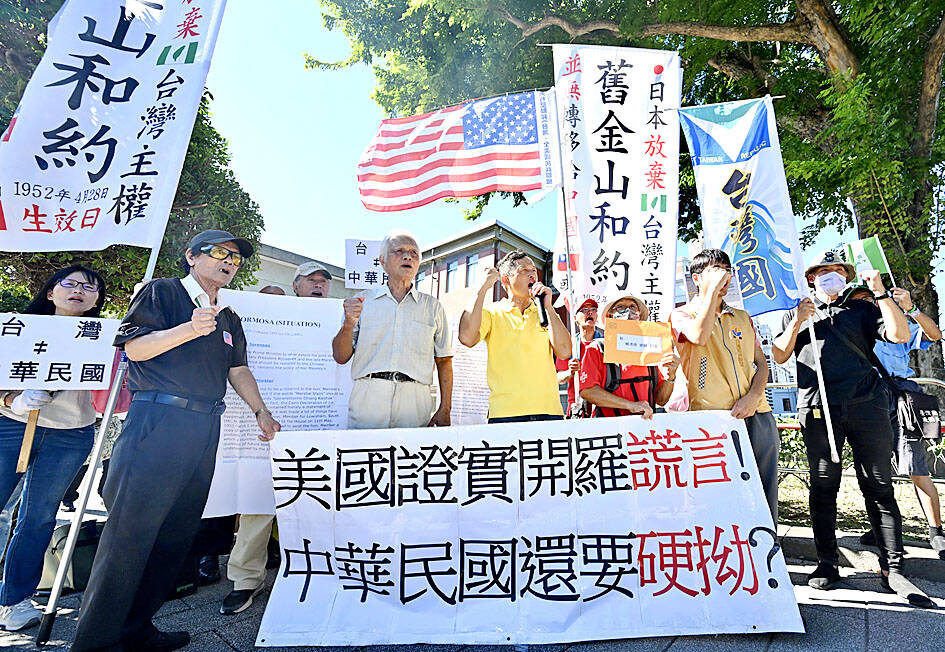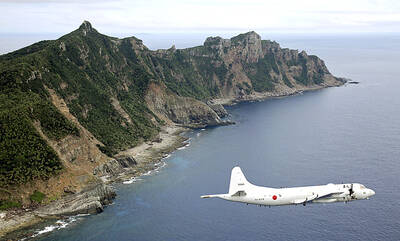The American Institute in Taiwan’s (AIT) comments that World War-II era documents do not determine Taiwan’s political status accurately conveyed the US’ stance, the US Department of State said.
An AIT spokesperson on Saturday said that a Chinese official mischaracterized World War II-era documents as stating that Taiwan was ceded to the China.
The remarks from the US’ de facto embassy in Taiwan drew criticism from the Ma Ying-jeou Foundation, whose director said the comments put Taiwan in danger.

Photo: CNA
The Chinese-language United Daily News yesterday reported that a US State Department spokesperson confirmed the AIT’s position.
They added that the US would continue to support Taiwan in the face of military, economic, legal and diplomatic pressure from China, and that the US, together with its international partners, firmly supports peace and stability across the Taiwan Strait and opposes any unilateral attempts to change the “status quo,” especially through force or coercion, the newspaper said.
Former AIT chairman Richard Bush and former AIT deputy director Robert Wang (王曉岷) said in separate e-mails that the US does not consider the political status of Taiwan to have been determined by any World War II-era documents, and that Washington expects the issue to be resolved peacefully.

Photo: Lo Pei-de, Taipei Times
Wang cited the Taiwan Relations Act (TRA), a 1979 US law governing its exchanges with Taiwan after Washington switched diplomatic recognition to Beijing.
The act made clear that “the United States decision to establish diplomatic relations with the People’s Republic of China [PRC] rests upon the expectation that the future of Taiwan will be determined by peaceful means,” he quoted the act as saying.
“In other words, the TRA makes clear that the US does not consider the political status of Taiwan to have been determined by any previous documents, including the World War II-era declarations or treaties,” he wrote.
Bush shared a similar view, saying that the US has long stated that “cross-strait differences should be resolved peacefully and with the assent of the people of Taiwan.”
On Aug. 15, Chinese Minister of Foreign Affairs Wang Yi (王毅) said that the 1943 Cairo Declaration and 1945 Potsdam Proclamation “clearly defined Japan’s responsibility for the war and required that Japan return all the territories it had stolen from China, including Taiwan.”
He said that was “an indisputable outcome of the victory in the World Anti-Fascist War and constitutes an important part of the postwar international order.”
An unnamed AIT spokesperson said that Beijing “intentionally mischaracterizes” World War II-era documents, including the Cairo Declaration, the Potsdam Proclamation and the Treaty of San Francisco, “to try to support its coercive campaign to subjugate Taiwan.”
“Beijing’s narratives are simply false, and none of these documents determined Taiwan’s ultimate political status,” the spokesperson said. “False legal narratives are part of Beijing’s broader campaign to try to isolate Taiwan from the international community and constrain the sovereign choices of other countries regarding their interactions with Taiwan.”
The AIT’s comments on the issue echoed Minister of Foreign Affairs Lin Chia-lung’s (林佳龍) Aug. 16 statement rebuking Wang’s remarks.
Lin said that after World War II, the 1951 San Francisco Peace Treaty — binding under international law — superseded the Cairo Declaration and the Potsdam Proclamation.
The treaty did not cede Taiwan to the PRC, and the PRC has never governed Taiwan, he said.
Lin said that the Republic of China (ROC) is the “sole legitimate government” administering Taiwan and representing it internationally.
He added that this established the cross-strait “status quo” in which the ROC and the PRC exist as equals, with neither subordinate to the other.

MISINFORMATION: The generated content tends to adopt China’s official stance, such as ‘Taiwan is currently governed by the Chinese central government,’ the NSB said Five China-developed artificial intelligence (AI) language models exhibit cybersecurity risks and content biases, an inspection conducted by the National Security Bureau (NSB) showed. The five AI tools are: DeepSeek, Doubao (豆包), Yiyan (文心一言), Tongyi (通義千問) and Yuanbao (騰訊元寶), the bureau said, advising people to remain vigilant to protect personal data privacy and corporate business secrets. The NSB said it, in accordance with the National Intelligence Services Act (國家情報工作法), has reviewed international cybersecurity reports and intelligence, and coordinated with the Ministry of Justice Investigation Bureau and the National Police Agency’s Criminal Investigation Bureau to conduct an inspection of China-made AI language

BOOST IN CONFIDENCE: The sale sends a clear message of support for Taiwan and dispels rumors that US President Donald Trump ‘sold out’ the nation, an expert said The US government on Thursday announced a possible sale to Taiwan of fighter jet parts, which was estimated to cost about US$330 million, in a move that an expert said “sends a clear message of support for Taiwan” amid fears that Washington might be wavering in its attitude toward Taipei. It was the first announcement of an arms sale to Taiwan since US President Donald Trump returned to the White House earlier this year. The proposed package includes non-standard components, spare and repair parts, consumables and accessories, as well repair and return support for the F-16, C-130 and Indigenous Defense Fighter aircraft,

CHECKING BOUNDARIES: China wants to disrupt solidarity among democracies and test their red lines, but it is instead pushing nations to become more united, an expert said The US Department of State on Friday expressed deep concern over a Chinese public security agency’s investigation into Legislator Puma Shen (沈伯洋) for “secession.” “China’s actions threaten free speech and erode norms that have underpinned the cross-strait ‘status quo’ for decades,” a US Department of State spokesperson said. The Chongqing Municipal Public Security Bureau late last month listed Shen as “wanted” and launched an investigation into alleged “secession-related” criminal activities, including his founding of the Kuma Academy, a civil defense organization that prepares people for an invasion by China. The spokesperson said that the US was “deeply concerned” about the bureau investigating Shen

DISPUTE: A Chinese official prompted a formal protest from Tokyo by saying that ‘the dirty head that sticks itself out must be cut off,’ after Takaichi’s Taiwan remarks Four armed China Coast Guard vessels yesterday morning sailed through disputed waters controlled by Japan, amid a diplomatic spat following Japanese Prime Minister Sanae Takaichi’s comments on Taiwan. The four ships sailed around the Senkaku Islands — known as the Diaoyutai Islands (釣魚台) to Taiwan, and which Taiwan and China also claim — on Saturday before entering Japanese waters yesterday and left, the Japan Coast Guard said. The China Coast Guard said in a statement that it carried out a “rights enforcement patrol” through the waters and that it was a lawful operation. As of the end of last month,